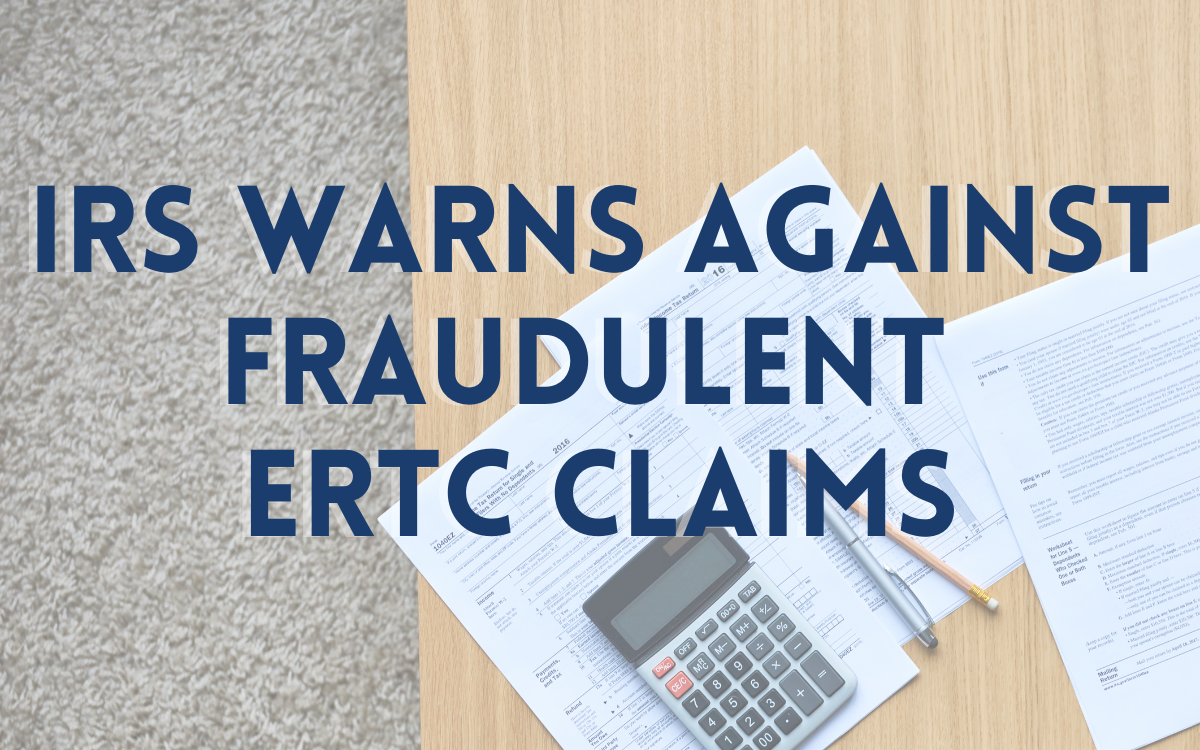ERTC Eligibility: IRS provides guidance on supply chain issues and warns against fraudulent claims
 By Mark W. Banks, CPA, CFE, MAFF
By Mark W. Banks, CPA, CFE, MAFF
The Employee Retention Tax Credit (ERTC) has been a lifeline for many businesses during the COVID-19 pandemic, providing financial relief to eligible employers.
However, the focus has shifted toward identifying aggressive or fraudulent claims in the program. In addition to scrutinizing businesses seeking the credits, the IRS is increasing its audits and criminal investigations into promoters and companies suspected of making improper ERTC claims to combat potential misuse of the credit.
One notable observation made by the IRS is that ERTC claims filed for later eligible periods, such as those referring to a full or partial suspension (more than nominal) of the operation of a trade or business due to a governmental order in the second or third quarters of 2021, tend to be more aggressive. This is because, by mid-2021, most COVID-19 mandates ended, allowing operations to return to a semblance of normalcy.
- NOTE: Under the current law, businesses are able to file claims for the credit until April 15, 2025, so it is best not to delay if you wish to pursue this credit.
The following is a closer look at how recent IRS guidance impacts businesses seeking ERTC assistance and the necessary steps to help ensure compliance with the guidelines.
ERTC eligibility and supply chain disruptions
In its original notice 2021-20, the IRS outlined two primary criteria for ERTC eligibility: a full or partial suspension of operations due to a governmental order and a significant decline in gross receipts. A recent IRS memorandum -- AM 2023-005 -- addresses supply chain disruptions and their impact on ERTC eligibility, offering valuable insights for businesses navigating this complex area.
- For a more detailed look at the IRS memorandum, including various examples of ERTC-qualifying situations, click here: https://www.cpabr.com/article-new-memorandum-on-ERTC-eligibility-due-to-supply-chain-disruptions
The IRS memorandum clarifies that employers may be eligible for ERTC if they experience supply chain disruptions due to a specific governmental order imposed on the Employer suspending its operations and, a more than nominal portion of its business operations were suspended (see Q&A #11 within IRS 2021-20).
A word of caution
If you’re contemplating ERTC claims, we strongly advise engaging a reputable advisor to assist with eligibility reviews and credit calculations. The risk of fraud and aggressive marketing of ERTC claims emphasizes the importance of thorough assessments and adherence to the qualifying criteria.
The IRS also warned about potential scams and fraudulent ERTC promoters who aggressively market eligibility without considering the required qualification criteria. Businesses should be cautious of generic calls, mailings imitating official IRS documents, and promoters guaranteeing minimum credit refunds. Legitimate ERTC claims must have adequate supporting documentation and adhere to the established eligibility criteria.
Remember: The IRS may require businesses that receive ERTC for reasons later ruled invalid, may have to not only repay the credited amount but penalties and interest as well.
Signs of an aggressive ERTC promoter include:
- Generic calls or advertisements
- Mailings that imitate that of an official IRS document
- Claiming eligibility without understanding your unique situation
- Significant up-front fees and/or contingency-based pricing
- Guaranteeing a minimum credit refund
ERTC next steps
We advise businesses seeking ERTC relief to take the following steps:
- Collaborate with trusted advisors: Work with trusted advisors or reputable tax professionals who possess a detailed understanding of your business and can help determine if you are eligible for the ERTC.
- Thoroughly discuss eligibility: Engage in a detailed discussion with your trusted advisor about the specifics of eligibility to ensure consideration of all factors relevant to your business.
- Set aside ERTC funds: If you have received or applied for ERTC, consider segregating the funds in a separate account if you don't need to use them for your day-to-day operations. This precaution will help ensure you can repay the IRS promptly if the agency determines you are not eligible for the credit.
What happens if you improperly claimed the credit: The IRS recently issued a FAQ stating anyone who improperly claims the ERTC that they must pay It back, possibly with penalties and interest. The IRS will be providing more information as it becomes available.
Bottom line
By diligently documenting and supporting their eligibility claims, businesses can navigate the ERTC process effectively and secure the financial assistance they are eligible for during these uncertain times.
The Boyer & Ritter team keeps track of the latest developments and is ready to help you with ERTC relief while following the guidelines provided by the IRS.



